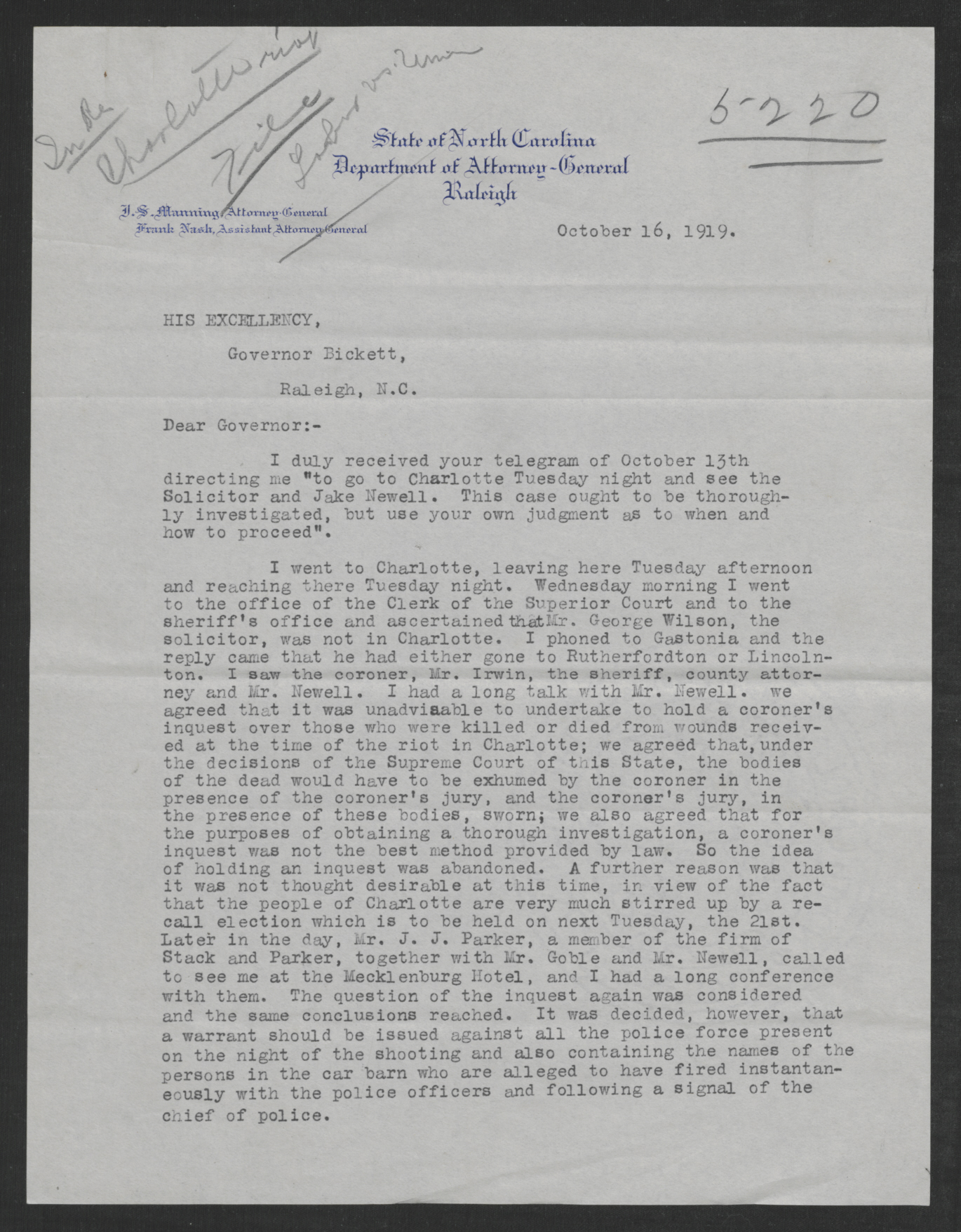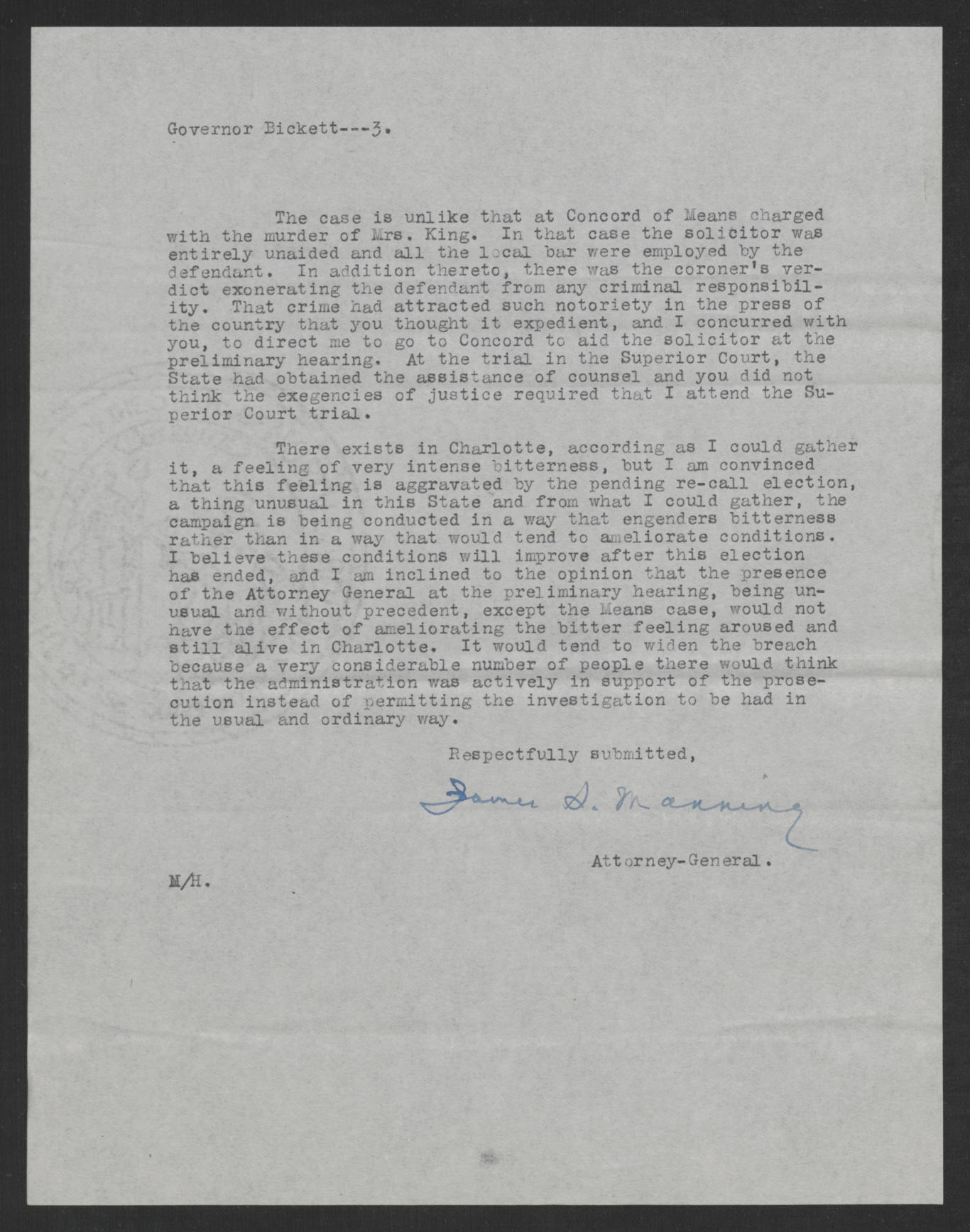State of North Carolina
Department of Attorney-General
Raleigh
October 16, 1919.
HIS EXCELLENCY,
Governor Bickett,
Raleigh, N.C.
Dear Governor:-
I duly received your telegram of October 13th directing me “to go to Charlotte Tuesday night and see the Solicitor and Jake Newell. This case ought to be thoroughly investigated, but use your own judgment as to when and how to proceed.”
I went to Charlotte, leaving here Tuesday afternoon and reaching there Tuesday night. Wednesday morning I went to the office of the Clerk of the Superior Court and to the sheriff’s office and ascertained Mr. George Wilson, the solicitor, was not in Charlotte. I phoned to Gastonia and the reply came that he had either gone to Rutherfordton or Lincolnton. I saw the coroner, Mr. Irwin, the sheriff, county attorney and Mr. Newell. I had a long talk with Mr. Newell. we agreed that it was unadvisable to undertake to hold a coroner’s inquest over those who were killed or died from wounds received at the time of the riot in Charlotte; we agreed that, under the decisions of the Supreme Court of this State, the bodies of the dead would have to be exhumed by the coroner in the presence of the coroner’s jury, and the coroner’s jury, in the presence of these bodies, sworn; we also agreed that for the purposes of obtaining a thorough investigation, a coroner’s inquest was not the best method provided by law. So the idea of holding an inquest was abandoned. A further reason was that it was not thought desirable at this time, in view of the fact that the people of Charlotte are very much stirred up by a recall election which is to be held on next Tuesday, the 21st. Later in the day, Mr. J. J. Parker, a member of the firm of Stack and Parker, together with Mr. Goble and Mr. Newell, called to see me at the Mecklenburg Hotel, and I had a long conference with them. The question of the inquest again was considered and the same conclusions reached. It was decided, however, that a warrant should be issued against all the police force present on the night of the shooting and also containing the names of the persons in the car barn who are alleged to have fired instantaneously with the police officers and following a signal of the chief of police.
I was surprised to ascertain that no such warrant had been issued and no such warrant had been applied for, and in fact, no other than the investigation by the grand jury hereinafter referred to, which is, of course, secret and entirely ex parte, had been attempted. Unfortunately, it seems to me, the whole thought seemed to be that a coroner’s inquest has some peculiar efficacy and the other methods usually resorted to and always open, neglected and overlooked.
I ascertained that the grand jury of the county had, at a recent term, begun the investigation, and that it had either returned true bills against certain of the rioters or it had made presentments and that the investigation of the grand jury had not been concluded. In the county of Mecklenburg, they have, by a statute, two grand juries, each serving respectively six months of the year and selected to the first court in January and the first court after 1st of July. I further ascertained that the executive counsel of the Labor Union (I am not sure that I have the name of this Board correct) employed Mr. Jake Newell of Charlotte and the firm of Stack and Parker of Monroe to prosecute any and all proceedings which they may advise, looking to the apprehension and investigation of any parties participating in the killing of the persons who were killed on the 25th and 26th of August.
I did not have an opportunity to confer with the solicitor of the district, but I have no reason to apprehend that Mr. Wilson will not fully discharge his duty. Mr. Parker stated that his partner, Mr. A. M. Stack, a former solicitor, would be present and would take active part in the preliminary investigation before the justice of the peace who would issue the warrant and would participate actively in any further proceedings.
Mr. Newell, Mr. Goble and Mr. Parker stated to me that they very much desired my presence at the preliminary investigation and that they intended to request you to direct me, as the Attorney General of the State, to be present at this preliminary hearing. In view of the fact that able, capable and experienced counsel represent the prosecution, in addition to the solicitor, I do not think that the Attorney General ought to be required to take part in this investigation or other proceedings other than is usually and customarily done by the Attorney General. While I think that every violation of the law should be carefully and fully investigated by the proper authorities, I see nothing in this case that should call for any extraordinary proceeding or any extraordinary course.
The case is unlike that at Concord of Means charged with the murder of Mrs. King. In that case the solicitor was entirely unaided and all the local bar were employed by the defendant. In addition thereto, there was the coroner’s verdict exonerating the defendant from any criminal responsibility. That crime had attracted such notoriety in the press of the country that you thought it expedient, and I concurred with you, to direct me to go to Concord to aid the solicitor at the preliminary hearing. At the trial in the Superior Court, the State had obtained the assistance of counsel and you did not think the exegencies of justice required that I attend the Superior Court trial.
There exists in Charlotte, according as I could gather it, a feeling of very intense bitterness, but I am convinced that this feeling is aggravated by the pending re-call election, a thing unusual in this State and from what I could gather, the campaign is being conducted in a way that engenders bitterness rather than in a way that would tend to ameliorate conditions. I believe these conditions will improve after this election has ended, and I am inclined to the opinion that the presence of the Attorney General at the preliminary hearing, being unusual and without precedent, except the Means case, would not have the effect of ameliorating the bitter feeling aroused and still alive in Charlotte. It would tend to widen the breach because a very considerable number of people there would think that the administration was actively in support of the prosecution instead of permitting the investigation to be had in the usual and ordinary way.
Respectfully submitted,
James S. Manning
Attorney-General.
M/H







